Current political leaders in Northern Ireland need to act with the same "courage and vision" as those who secured the Good Friday Agreement, the man who chaired the 1998 negotiations has said.
Senator George Mitchell said history would judge favourably those who had helped to bring about the historic peace deal.
Several events were held in Northern Ireland today as people reflected 25 years on from the Good Friday Agreement.
While the 25th anniversary of the signing of the accord is 10 April, Good Friday will always be associated with the diplomatic feat that brought 30 years of bloodshed largely to an end.
A number of key architects of the deal as well as current politicians gathered for a commemorative event at Stormont.
We need your consent to load this rte-player contentWe use rte-player to manage extra content that can set cookies on your device and collect data about your activity. Please review their details and accept them to load the content.Manage Preferences
Delivering a video address, Mr Mitchell said the greatest heroes from that time were the people of Northern Ireland and their political leaders.
He said: "The people supported, worked for and established a democratic, peaceful process as their preferred form of governance.
"They rejected violence as a way to resolve their differences."
Mr Mitchell said many politicians had taken huge risks.
He added: "But they did what was right for the people they represented and history will judge them favourably."
The former senator said the Good Friday Agreement did not resolve all outstanding issues but that it did end political violence.
More than 200 people attended the ceremony, including key figures in the agreement negotiations, among them former taoiseach Bertie Ahern and former Sinn Féin leader Gerry Adams.
Past and present members of the Stormont Assembly attended alongside relatives of some of the leading participants in the negotiations.
The programme also included a number of musical performances.
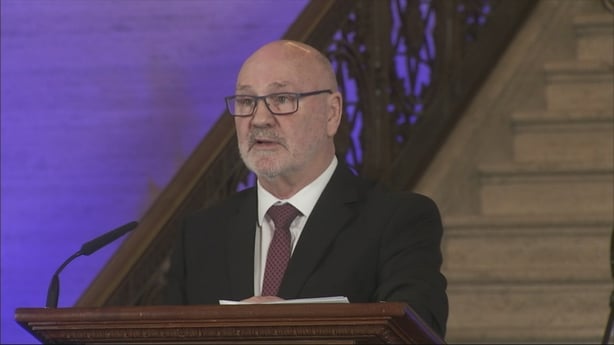
Stormont speaker Alex Maskey said the Good Friday Agreement was a "new beginning".
Addressing the ceremony at Parliament Buildings, Mr Maskey said: "On Good Friday, 25 years ago, after years of negotiations and against all expectations, an historic agreement was reached.
He described it as "an honourable compromise".
Mr Maskey said the agreement contained challenges for everyone but it did not diminish any of the deeply-held political views of those present.
"Nor did it mean that the future would be easy.
"But it was a new beginning," he said.
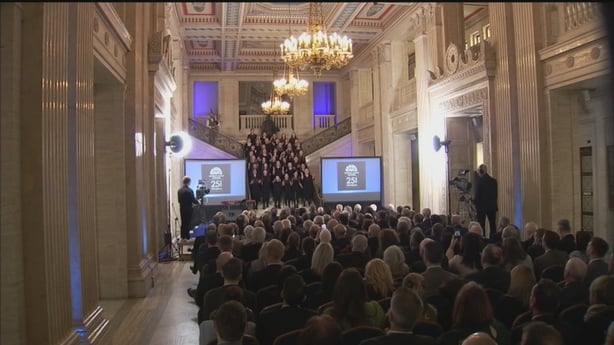
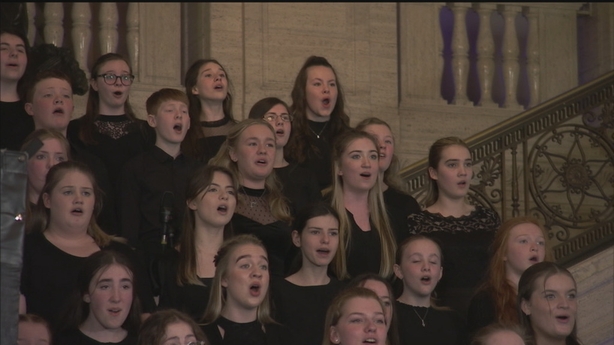
'Extraordinary progress'
The first speaker of the Stormont Assembly John Alderdice hailed the "extraordinary progress" which led to the Good Friday Agreement.
Addressing the ceremony he said: "In those days we made extraordinary progress, not least because we didn't focus all the time on constitutions and institutions and procedures.
"What we did do was to try and deal with the disturbed historic relations between our communities and make sure we found ways of relating to each other."
Mr Alderdice said the difficulties faced by Northern Ireland now were not as great as those 25 years ago.
Monica McWilliams, a co-founder of the Women's Coalition, paid tribute to all the politicians who had died since the agreement was signed.
PUP leader Billy Hutchinson said the agreement came about because different political parties all pulled in the same direction.
"We got there in the end," he said.
Mr Adams said countless lives had been saved by the Good Friday Agreement.
"The last 25 years have been up and down, and there have been many twists and turns, but one thing is for certain, we are all in a better place.
"Despite current challenges, the future is bright.
"If you doubt that, think of the countless lives that have been saved or reflect on events in other parts of the world at this time."
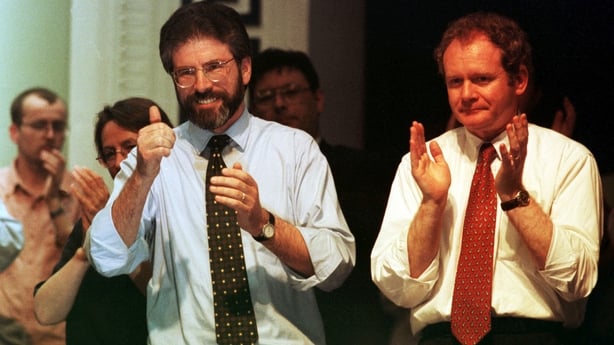
Mr Adams said there is a lot to be thankful for and there is still a lot to be done.
He said the agreement was for everyone and it was "here to stay".
Read more
Latest headlines on the Good Friday Agreement
At a glance: The Good Friday Agreement
The unresolved issues of the Troubles
Trauma – 25 years after the Good Friday Agreement
The young people in NI moving their communities forward
'Endorsed by the people'
Former Ulster Unionist leader Reg Empey said two generations had grown up in Northern Ireland with no working knowledge of the Troubles.
He said that one of the main strengths of the deal was that it had been endorsed by the public.
Referring to young people taking part in the ceremony, Mr Empey said: "They are the second generation that has grown up in this country who have no working knowledge of what violence and our Troubles meant.
"If there's nothing else it has achieved, that in itself is a victory."
He added: "The agreement isn't and wasn't perfect, there is no doubt about that, it has flaws.
"But the one thing that stands out about this agreement above others was the fact that it was endorsed by the people before it was implemented.
"That gave it a strength and a legitimacy."
Former SDLP leader Mark Durkan paid tribute to those who negotiated the agreement and said they provided a lesson for today.
He said: "We can bring back the spirit and the ethic that they put into achieving the agreement.
"That sense of collective purpose, that ability to cut through all the noise of difference and create shared institutions and shared arrangements."
Meanwhile, people from across Northern Ireland's divided community have come together at one of the region's most notorious peace walls to mark the anniversary of the Good Friday Agreement.
New Life City Church, which stands in a former no-man's land between security gates which separate the predominantly Catholic and Nationalist Falls Road with the mainly Protestant and Unionist Shankill Road, organised the event this afternoon during which a linked human chain spanned the gates.
Those attending included West Belfast MP Paul Maskey and Lord Mayor Tina Black.
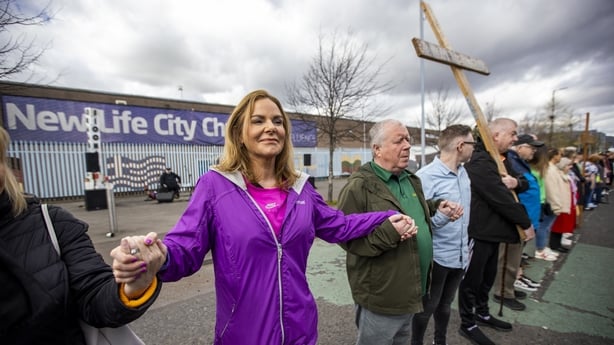
Pastor Jack McKee said while the agreement has not been perfect, they wanted to mark the fact the last 25 years were better than the previous decades.
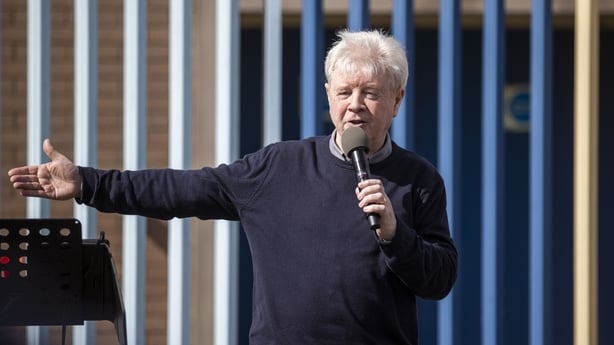
The Good Friday Agreement was a deal that many had thought impossible.
The agreement brought an end to Northern Ireland's Troubles, a conflict in which more than 3,500 people were killed and tens of thousands injured and bereaved.
The deal was signed on Good Friday 1998.
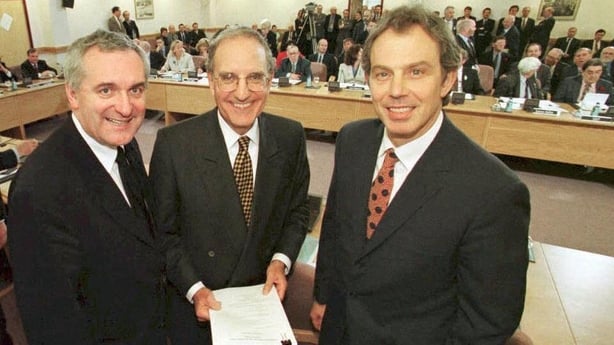
One of the key components was the creation of a power-sharing assembly at Stormont designed to force nationalists and unionists to work together in a devolved government.
A quarter of a century later, the power-sharing administration is in limbo as the Democratic Unionist Party has refused to end its boycott as part of its campaign against post-Brexit trade arrangements between the UK and the European Union.
Strand two of the agreement, a north-south ministerial council bringing together members of the Stormont Executive and the Irish Government to cooperate on matters of mutual interest, is also in suspension.
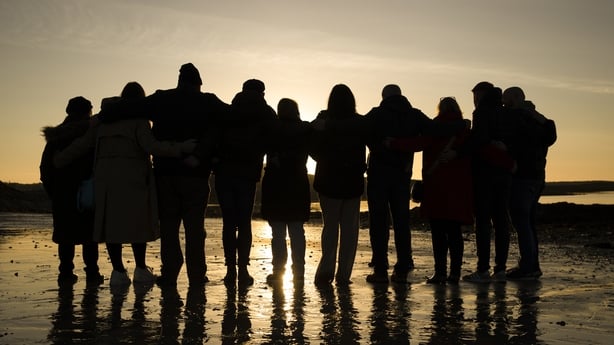
US President Joe Biden has opted not to visit Stormont during his visit to Belfast next week to mark the anniversary.
The White House view appears to be that it does not make political sense to visit the home of a government that is not currently functioning.
Additional reporting PA







